DAMASCUS, Nov. 14 -- The Syrian government re-controlled the town of Hajjira in the countryside of Damascus after dislodging the country's rebels, while it said it would seriously attend the Geneva II conference on Syria.
The Syrian troops' recent progress came as part of their large-scale operation to wrest back control of some rebel-held areas in the countryside of Damascus.
Hundreds of the rebel fighters fled Hajjira following the Syrian troops' recapture of the town. The Syrian troops meant to show the determination of regaining the upper hand ahead of the Geneva II conference on Syria.
Earlier this week, the army recaptured another key town east of Damascus, thus tightening its siege against the rebels in the Yarmouk camp and Hajar al-Aswad.
In an interview with the Syria's main TV channel on Wednesday, Syrian Information Minister Omran al-Zoubi said that the Syrian government will attend the Geneva II conference on Syria and will be open to all ideas.
He stressed the Syrian government's seriousness to attend the peace talks in Geneva to come up with a political solution to the protracted crisis in Syria.
The minister said that some parties will try to thwart the conference "as they thwarted the Iranian talks in Geneva," referring to the faltering talks between Iran and Western powers regarding Tehran's nuclear program.
He slammed the exiled opposition coalition's preconditions for attending the conference, saying that his government was not concerned with the preconditions of the opposition and the Syrian opposition in exile had no political program.
He also noted that the opposition, which had been reluctant to participate in peace talks with representatives of the Syrian government, changed its stance because of the pressure of its Western patrons.
Earlier this week, the exiled Syrian National Coalition (SNC), the main opposition umbrella in exile, said it would attend the Geneva II conference but placed a condition that President Bashar al-Assad should have no role in the transitional period in the war-ravaged country.
The Assad administration repeatedly said it rejects preconditions prior to negotiations.
On other developments, conflicts were still going on in the country as Syrian troops advanced on several fronts, mainly the outskirts of Damascus and the southern swath of Aleppo province
Eight people were killed and some others wounded in twin rocket attacks against two areas in Syria's northern city of Aleppo, the state-run SANA news agency reported Wednesday.
Nine people were killed and 16 others wounded on Wednesday in a mortar attack against districts of Syria's central province of Homs, SANA said.
The attack is part of ongoing mortar attacks that have been staged on daily bases in several Syrian cities, most notably in Damascus.
Earlier on Wednesday, at least two people were killed in a renewed attack against the Damascus' districts of Bab Touma, and Zablatani.
People in Damascus have become fed up with the indiscriminate shelling by the rebels, who claimed that they targeted security and military positions, but their mortars frequently landed in residential areas.
The rebels alleged that shelling Damascus came as a response to the tight siege by the government troops.
The Lebanese resistance party "Hezbollah" accused Israel Wednesday of using all its powers to incite a Western attack against Syria.
Hezbollah Chief Sayyed Hassan Nasrallah, who made a rare public appearance in the Beirut neighborhood of Rouweiss, said that Israel used all its power lately to prepare for an attack on Syria.
Nasrallah accused some Arab countries of acting similarly with Israel by rejecting any political solution in Syria and an international agreement with Iran.
Geneva II Conference had been slated for late November, but it was reportedly to be postponed amid Western efforts to persuade the Syria-based political opposition groups to take part in it.
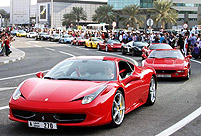 Luxury-cars parade held in Dubai
Luxury-cars parade held in Dubai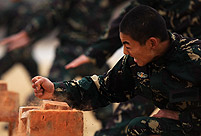 Special forces take tough training sessions
Special forces take tough training sessions Fire guts 22-storey Nigeria commercial building in Lagos
Fire guts 22-storey Nigeria commercial building in Lagos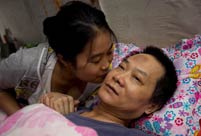 A girl takes care of paralyzed father for 10 years
A girl takes care of paralyzed father for 10 years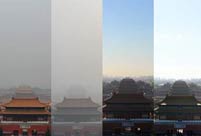 A record of Beijing air quality change
A record of Beijing air quality change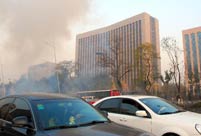 In pictures: explosions occur in Taiyuan
In pictures: explosions occur in Taiyuan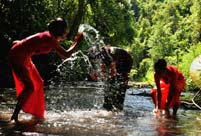 Live a harmonious life in Pu'er, SW China
Live a harmonious life in Pu'er, SW China Weekly Sports Photos
Weekly Sports Photos Gingko leaves turn brilliant golden yellow in Beijing
Gingko leaves turn brilliant golden yellow in Beijing Maritime counter-terrorism drill
Maritime counter-terrorism drill Loyal dog waits for master for six months
Loyal dog waits for master for six months Living in an urban village: 'Iron-digger' Xiong Sansan
Living in an urban village: 'Iron-digger' Xiong Sansan China in autumn: Kingdom of red and golden
China in autumn: Kingdom of red and golden National Geographic Traveler Photo Contest
National Geographic Traveler Photo Contest Weekly Sports Photos
Weekly Sports PhotosDay|Week|Month